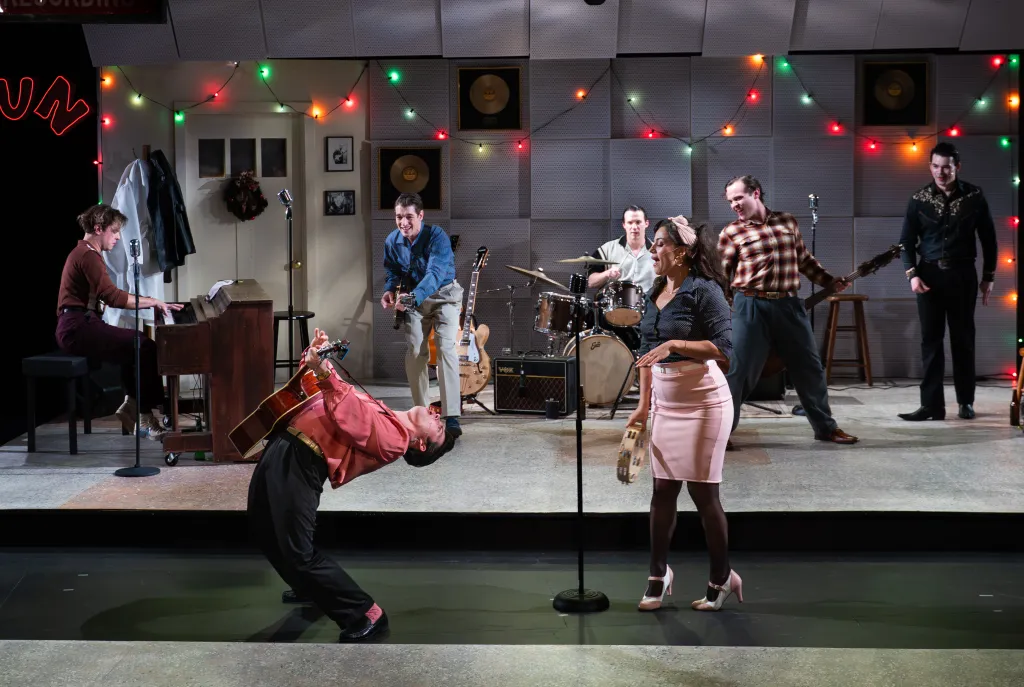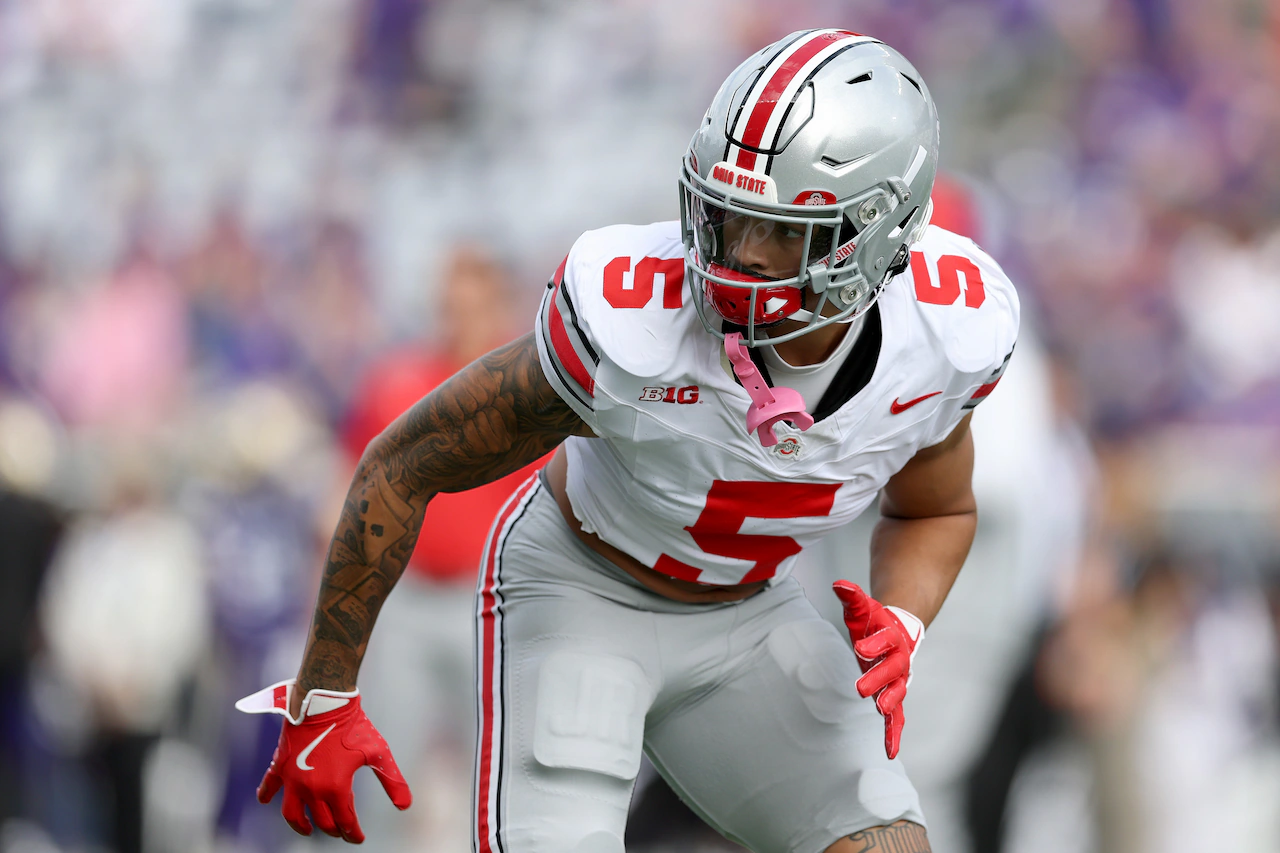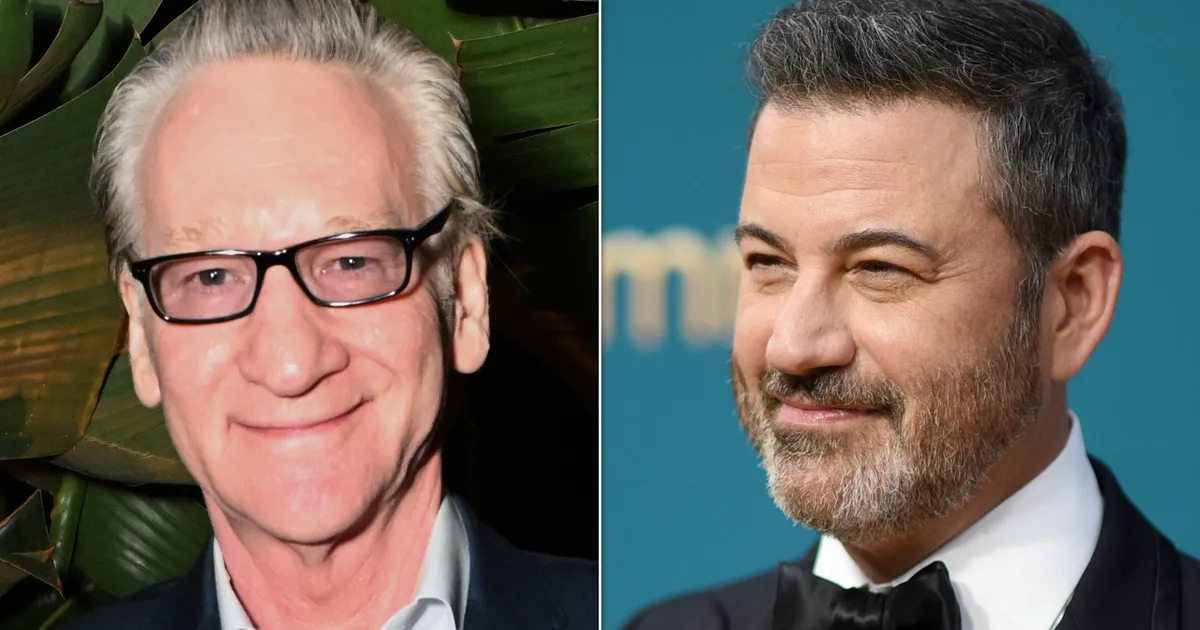
“Million Dollar Quartet” is a jukebox musical phenomenon that, unlike a lot of other pop musical bios, doesn’t follow the life story of a single star or band but instead tackles four famous rockers at once, having them interact energetically both as musicians and as human beings.
Playhouse on Park is doing a new production of the musical through Oct. 19, Connecticut’s latest chance to catch a show that toured through the state many times .
This ever-popular, hard-rocking show is based on an actual recording session at Sun Studios on Dec. 4, 1956, where Carl Perkins of “Blue Suede Shoes” fame was recording what would become one of his best-known songs, “Matchbox.” The studio’s owner and producer Sam Phillips brought in one of the label’s new acquisitions, Jerry Lee Lewis, to add his inimitable piano style to the track. Another Sun artist, Johnny Cash, came to hang. Then Elvis Presley stopped by with a female friend to visit Phillips and a jam commenced.
The impromptu rock star summit made the Memphis papers the very next day but the “Million Dollar Quartet” recordings weren’t made publicly available until 1981. They mainly consist of gospel tunes, old pop standards, a few rockabilly hits they all knew and some Christmas songs, In the stage musical, however, the stars are trying to one-up each other by playing their greatest hits of that time, from Perkins’ “Blue Suede Shoes” to Cash’s “I Walk the Line” to Elvis’ “That’s All Right” to a frantic finale of Lewis’ “Whole Lotta Shakin’.” In real life, the woman who Elvis brought to the studio was his then-girlfriend Marilyn Evans. In the musical she’s a character called Dyanne who sings along with the boys.
The drama is based around rising and falling fortunes. Perkins’ hitmaking days seem over. Lewis is on the rise, with some liabilities. While Elvis has enjoyed unparalleled pop culture success as both a pop star and a Hollywood movie star, he feels unsatisfied and is angling to have his old mentor Phillips join him at the RCA label and make records together again. Phillips is torn about leaving the Sun Studios empire he built up from nothing, especially when he’s about to extend the contract of his latest hot act, Cash. What Phillips doesn’t know is that Cash has already made plans to leave Sun for Columbia Records.
All of these career crises, as well as the personal crises which fuel them, make for a jam-packed night where over 20 lively roots rock classics alternate with tales of impoverished childhoods, business woes, touring accidents, improper relationships and more.
The show was developed in Florida in 2006, then in Chicago in 2008 where it was an immediate hit and ran in that city for over seven years. It opened on Broadway in 2010 and ran for over a year, then moved to an off-Broadway theater where it ran for nearly another year. But “Million Dollar Quartet” was just getting started. There was a London production and a seasonal “Million Dollar Quartet Christmas” variation. The show began touring in 2011 and, including the Christmas version, toured on and off for the next dozen years. Meanwhile, unrelated concert versions covering the same songs and impersonating the same artists, as well as veterans of “Million Dollar Quartet” who began their own roots rock bands, started filling theaters and clubs.
Now Presley, Lewis, Cash and Perkins have made their rockin’ return to the regional theater realm. In Connecticut, Seven Angels in Waterbury did “Million Dollar Quartet” back in 2017 when the show was still actively touring. Ivoryton Playhouse did it in 2023, ACT of CT did it in 2024 and Sharon Playhouse did it this past June.
All productions of “Million Dollar Quartet” are not alike. The songs in the show are the roots rock classics you know and love, but those who’ve loved these songs for decades know that there are many different ways to play them and that the artists themselves would revisit them in different styles over the years.
The overall impression of this one is that it’s clean. The music studio setting is stark and white and uncluttered. The desk where Phillips sits is at the edge of the stage, as far as possible from the studio area, adding the clinical feel. Since the performers use body mics the mic stands are just there for effect and there are no cords to trip over. The rockers are clean-cut — even Lewis’ ragged long hairstyle seems impeccably groomed.
At Playhouse on Park, Alex Burnett, who plays Lewis, has stood atop his piano half a dozen times before, including at Sharon Playhouse. He does all the Lewis gestures — playing with his hair, resting his feet high up on the piano, knocking over the bench, etc. He is particularly fond of the way “The Killer” would swipe the righthand keys like he’s wiping a bar counter with a rag.
This is the fourth time Brian Steinberg has been Elvis in “Million Dollar Quartet” plus he was also in a show called “Elvis: A Musical Revolution.” He admirably sticks to mid-1950s Elvis in his portrayal while offering flashes of the decline that would happen in the next 20 years before his death in 1977.
This is the sixth “Million Dollar Quartet” for Chris Colley, who has generally been in the backing bands but is now prominent as Perkins and also serves as this production’s music director. It’s no big deal that he looks nothing like Perkins because his acting is solid. Unlike a lot of those who’ve played this role, Colley neatly underplays Perkins’ alcoholism, showing him as a non-stop drinker but of the inwardly deteriorating kind rather than overacting into physical frenzies. It’s a good choice, especially for a show with such a measured pace that saves its explosions for the end.
Even director Alessandro Gian Viviano is a former “Million Dollar Quartet” performer who’s played Elvis a dozen times —including at ACT of CT in Ridgefield. Gian Viviano understands the show as a tribute act where it’s important to get the songs right but also as a well-written heartfelt drama about male bonding, crises of conscience, competitive spirit, creative struggles and the desire to get ahead.
Of the four main stars, only Kendall McShane seems to have never done the show before, which is amazing because he’s got the ideal voice, intense stare and slow-burn attitude needed to play Cash. His somberness is a counterweight to Burnett’s Lewis giddiness and his low gravelly voice improves the quartet every time they sing in harmony.
John Elliott plays Phillips, the impresario who got this band together. This production has a surprise element in that the Phillips character joins the band at the very end, though we won’t reveal what instrument he plays.
In the thankless role of hanger-on Dyanne, Paloma D’Auria earns the boys’ respect and joins in on key numbers without upstaging them. There are also two background characters who are mainly musicians, Joey Nuhfer as Perkins’ bassist brother Jay Perkins and Jeffrey Kelly as drummer W.S. “Fluke” Holland. It’s hard to imagine any production of “Million Dollar Quartet” where the stand-up bassist doesn’t do tricks with that massive instrument, and Nuhfer has some special ones.
Playhouse on Park’s “Million Dollar Quartet” proceeds with a formal theatricality in that clean environment but can’t help getting messy and chaotic at the end when the musical basically becomes a tribute band concert with several encores. You leave the theater feeling invigorated and having learned a little about the earthbound roots of some rock gods. There is indeed a whole lot of shakin’ goin’ on.



